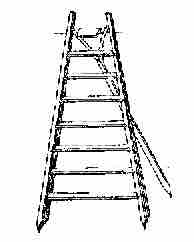Abstraction and the Abstraction Ladder
Abstraction is the process of perceiving similarities from our direct, specific observations in the universe, organizing the similarities, and then assigning a word label for the more general concept. The ability to simplify experiences with a word makes it easier to communicate, but it also makes us lose the connection to the specific meaning that we want to convey through the abstract wording.
Abstraction, the Process
I see a number of different objects and I see something similar about all of them, let's say the color. I take this one characteristic, the color, and give it a label, for example, red. Here I have a direct observable experience with the objects and I see the color in them. I abstract the color and give it the label red. For you my label red is not connected with the objects I saw, but you may see similar objects and learn to assign the same label, red, to the color. We group together all the similar experiences to form a higher-level concept, which includes all the specific, individual observations we are engaging in abstraction.
Abstraction Ladder, the Concept
S. I. Hayakawa explained the concept using a ladder . Hayakawa used his cow Bessie to illustrate the four levels of abstraction from highest level four at the top to lowest at the bottom.

Ladder
Think of abstraction as a ladder: the most specific, direct experiences are at the bottom and each step above is more abstract.
- 4 - Wealth
- 3 - Farm Asset
- 2 - Cattle
- 1 - Bessie, my cow
Lets look at another example with clothing. Level one is very specific, such as Levi 501. Moving up to level two, you have noun categories, such as clothing. Moving up a level, you have a broad noun class or group names such as manufactured goods or industry. Finally, at the top level, you have even more abstract concepts such as power, beauty, and casualness.
Almost anything can be described either in relatively abstract, general words or in relatively concrete, specific ones. You may say that you are writing on a piece of electronic equipment, or that you are writing on a laptop computer. You may say that your company produces consumer goods, or that it makes cell phones. When groups of words are ranked according to degree of abstraction, they form hierarchies.
Tailor the level of abstraction to the specific content and the audience level of understanding .
Using Concrete, Specific Words for Clarity
In general, as you move from one level to another while speaking, you will tailor the level of abstraction to the specific speech content and the audience level of understanding. You can increase the clarity, and therefore the usability, of your speaking by using concrete, specific words rather than abstract, general ones. Concrete words help your audience understand precisely what you mean. If you say that you want to produce television shows for a younger demographic segment, they won't know whether you mean teenagers or toddlers. If you say that you study natural phenomena, your audience won't know whether you mean volcanic eruptions or the migrations of monarch butterflies. Such vagueness can hinder audience from getting the information they need in order to make decisions and take action. When you want the audience to make a concrete connection to their direct experience, remember to come down to earth on the the abstraction ladder. You can move up the ladder again to talk about boarder concepts.
For example, you will draw heavily on level one to create images of specific people, places, or things in the minds of your audience. You may move up and down the level of abstraction as needed. For example, if you are talking about a top-level abstraction such as transportation, you may need to make it real for the audience by describing actual means of transportation such as your green mountain bike for city use or your blue and silver BMW for longer trips.
Abstract and general terms do have important uses for different audiences and occasions. For example, in scientific, technical, and other specialized fields, speakers often need to make general points, describe the general features of a situation, or provide general guidance for action.
Use abstract and specialized terminology to communicate messages economically.
Specialized, abstract terminology only works when your audience will understand them. You can use the specialized terminology of a particular profession or group if you know that they already have specific connections to the more abstract terminology. With audiences who understand the abstractions, the technical meanings can communicate messages economically with fewer words than if you started with specific instances at the bottom of the abstraction ladder.
Your objective when choosing words is not to avoid abstract general words altogether, but rather to avoid using them when your audience needs more specific, concrete connections to what you are saying.